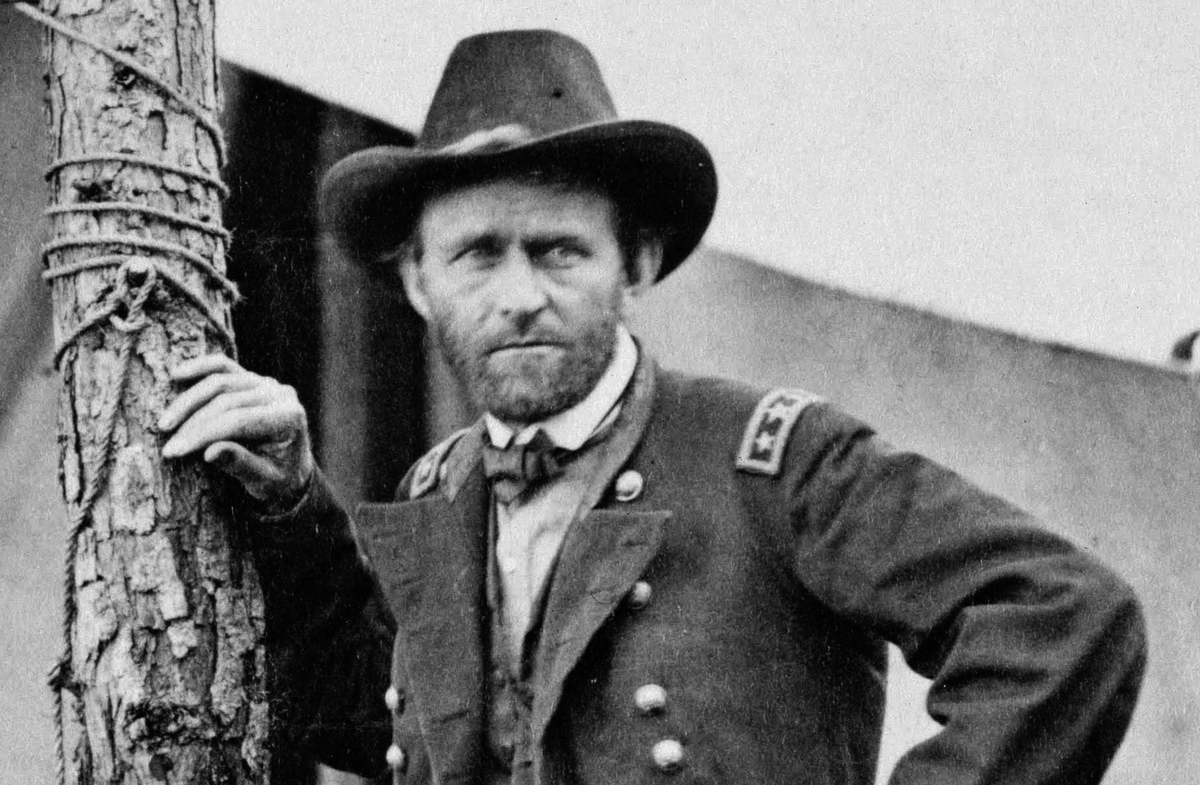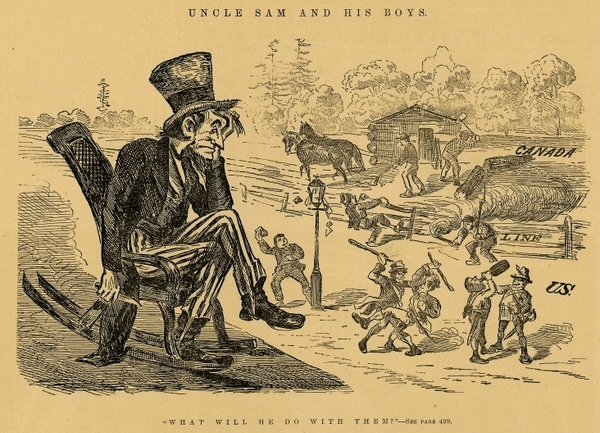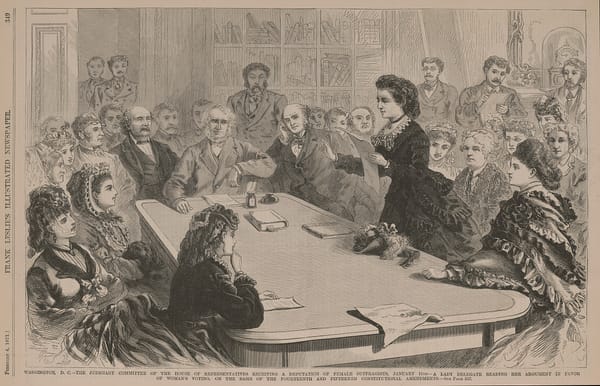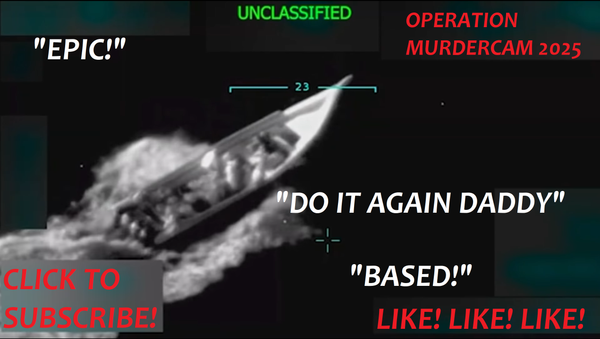Democrats Must Embrace War Mindset
We have exited a long period of peace and entered into a struggle not unlike war, in which all the old certainties have gone malleable and the future of the republic is at stake.

Then
The Emperor Napoleon assembled an army of two hundred thousand men on the Normandy coast of France. They bore a single purpose: the invasion of England and the winning of the War of the Third Coalition. As the emperor put it: "Let us be masters of the Channel for six hours and we are masters of the world." He was not wrong. If he landed his army on the shores of England, England would not survive. But to do this he needed command of the seas.
Just after noon on October 21st, 1805, off the Cape of Trafalgar, Admiral Horatio Nelson pointed the outnumbered fleet of England at the combined fleets of France and Spain and ran one final signal up the mizzenmast:
Engage the enemy more closely.
Nelson's plan was based on more than physical courage or mindless bloodlust. The prevailing orthodoxy was to form your ships in a single line, and then sail parallel to the enemy's line, exchanging fire in a long line of battle. Nelson instead drove his ships in two lines directly at the enemy, taking heavy fire—until they cut the enemy fleet into three pieces. After that Nelson simply trusted his subordinates to take their own initiative: find the enemy where you can, and destroy them.
It worked. The Royal Navy lost no ships of the line, while Napoleon lost eighteen. Nelson risked a great deal, but only by accepting that risk did he succeed against a superior force. Nelson did not survive the battle, but England did.
Now
We have exited a long period of peace and entered into a struggle not unlike war: one in which all the old certainties have gone malleable and the future of the republic is at stake. We can look to military theory to understand the necessary character of command in such times—and the dysfunctions that bad leadership is prone to, particularly an obsession with rules and norms: "If I follow the rules, at least I can't be blamed when we lose." Instead, we require leaders who are willing to take risks, take the initiative, and take the fight to the enemy.
The question is not one of policy or strategy. The question is one of character. History demonstrates how armies in peacetime reward and promote certain kinds of characters—which are typically unsuited to the demands of war. Understanding the kind of character that succeeds in the risky, terrifying, uncertain terrain of wartime can shed light on what we need to succeed in our own suddenly, shockingly uncertain times.
Peacetime breeds rule-followers. In war the rules go out the window. The old certainties become terrifyingly malleable. You are assailed on all sides by phantasms: and it takes a particular kind of moral courage to see your way through, take the initiative, and make the enemy more afraid of you than you are of him. War demands ratcatchers.
Republicans understand this clearly. MAGA has declared their intention to use a muscular assertion of presidential power to relitigate the fundamental principles of the republic, from the nature of checks and balances to the fundamental questions of citizenship, and to do so in the public and cultural arena
They call this regime politics, and they are waging it on every front. They aren't worried about what the old rules of politics say. They have heard the footsteps of the Lord of Hosts marching through history, and they understand that the rules can be changed. They are exercising every lever of power available to them to do so: legal, institutional, cultural, financial.
To them there are no "silos." Accusations of antisemitism are leveraged against Harvard in the cultural arena, even as federal control over research grants is leveraged to squeeze Harvard in the financial arena, all in order to extract affirmative action for conservatives in Harvard hiring and admissions. To conservatives these are not three separate silos "media engagement" "federal research policy" "undergraduate admissions," but a single war waged on many fronts—an attempt to change the meaning of who is American.
Meanwhile our modern-day Haigs and Gamelins have ceded the field because they are too afraid to fight on it. They cling to the fantasy of regular politics. They don't want to fight on this new field because they are afraid of losing. That fear will kill us. Peacetime is over. If we want to win, we must embrace war mindset.
War mindset
Carl von Clausewitz, the most influential military theorist of the West, after opening On War by explaining his conception of the fundamental logic of war, turns not to a discussion not of tactics or maneuver, but rather of the character necessary to command. Clausewitz speaks of the physical terror that overtakes you as you approach the front lines, as the cannonballs begin to fall around you, as you hear the rattle of grapeshot on roofs, as your comrades begin to be cut down by musket fire (I.4). He knew whereof he spoke, having fought on the front lines of the Napoleonic Wars.
War requires mastering this bodily fear. But for those in command, he explains, the fear runs deeper. The burden of command is crushing. Your mistakes will doom not just you but all the men trusted to your command and, possibly, your nation entirely. If Nelson had chosen wrong, if he had lost the English fleet, Napoleon would have crossed the Channel at the head of two hundred thousand French soldiers, and the whole arc of history would have bent.
"War has a way of masking the stage with scenery crudely daubed with fearsome apparitions," Clausewitz teaches (I.6). In war you are surrounded by phantasms. Fear plays tricks on the mind. Apparitions of easy victories and apparitions of calamitous defeats loom out of the fog of war. Your emotions will drag your intellect around like a dog, if you let them. Thus, "Strength of character does not consist solely in having powerful feelings, but in maintaining one's balance in spite of them," (I.3).
When I look at progressive politics today I see a community consumed by fear. A certain kind of Democratic politician is desperate to see who they can throw under the bus to guarantee their electoral success—which blood sacrifice they can make to Mammon to preserve their own hide. They style themselves bold truth-tellers, but the fear has consumed them.
Meanwhile, the progressive hordes on social media are positively consumed by fear. They are addicted to it. The easiest way to go viral on Bluesky is to post a link to some current event, plus some commentary about how this is the end of trans rights, or Trump's final consolidation of absolute power, or proof that the Democrats are about to throw us under the bus.
This is the thing: dooming is itself a liberation from the burden of choice. If everything is ruined forever, if your allies have already forsaken you, if the battle is already lost, you aren't responsible for your choices. They can't affect the outcome. You're free. Dooming is another escape from the burden of war mindset. Clausewitz knew this as well: "As a rule, most men would rather believe bad news than good," (I.6).
This fear can manifest in ways that seem paradoxical. According to Norman Dixon, "the person who fears failure prefers tasks which are either very easy or very difficult." If the task is trivially easy, there is no possibility of failure; if the task is difficult, failure is inevitable—and therefore you cannot be blamed when it arrives. But in war the only way to victory is through seeking out those achievable but risky battles.
Another escape from the burden of responsibility is a retreat into rules-obsession. "No one ever got fired for buying IBM," and if you simply follow "the rules" no one can blame you for what happens next. In our time this manifests in the form of Democratic politicians' polling obsessions. Every week they stick their finger in air to see which way the wind is blowing. I can understand this if your question is what TV ads to run in what markets four weeks before election day. If the critical election is four years away, it is nothing but moral cowardice—a fleeing in terror from the difficult but winnable arena of public opinion.
Republicans did not do issue polling to decide if they wanted to demonize immigrants and trans people. They knew from the outset they hated both of us, and then they went out there into the court of public opinion—bare and bloody-knuckled as it is—and fought to make what they believed popular.
War mindset is also built on trust. As Stephen Biddle notes, in a premodern army, you might be lined up shoulder-to-shoulder on a single field with all your comrades. In modern war your comrades are spread across a three-dimension battlefield thousands of square miles in extent. Your closest contact with another squad might be a voice on a staticky radio. The whole great combined-arms machine only works if everyone trusts everyone to do their part to the utmost—to stand and not to run, to bring excellence and ferocity, to do their job even at the risk of their own skin. When trust breaks down not all the kit in the world can save you—as Bashar al-Assad discovered to his dismay in 2024.
Today we progressives are eating each other alive from lack of trust. The base does not trust politicians to have their backs. Politicians do not trust their base to support them in the face of any friction. Different factions of the party eye each other warily, waiting to get sold out. Labor unions crow about tariffs and anti-immigrant raids; California's governor blathers about trans kids; the hordes of Bluesky tear down Sarah McBride any chance they get.
Contrast MAGA. During the campaign Trump made all kinds of moderate noises. And his base trusted him to nevertheless carry the MAGA standard into office, no matter what gestures he had to make to get elected. Much the same could be said of Barack Obama, who was beloved and trusted by the Democratic base, even as he explicitly came out against gay marriage. We all knew he didn't really mean it.
Most of all, war mindset requires strategic clarity. Trust is built on shared values. Moral courage springs from genuine conviction founded on sound principles. You will not find such conviction nor such principles in the latest polling. Morality is not a popularity contest. So where are they to be found? One can do worse than that old American gospel: we are all created equal. We are endowed with certain inalienable rights. Among these are life, liberty, and the pursuit of happiness. To secure these rights, governments are instituted among men, deriving their just powers from the consent of the governed.
Freedom. Equality. Democracy. I don't really care how well these poll. They're the truth. That truth is worth fighting for.
Tomorrow
The future direction of the Democratic Party has been much contested. Some have argued that it requires changes to the policy platform. Maybe we need to abandon trans, or woke, or embrace pro-life candidates. Others have argued that it is more a question of temperament: we need fighters. The latter is correct. We—progressive politicians, progressive thinkers, progressive voters—must embrace war mindset.
War mindset is not a mindset of mindless aggression, leaping after every set of jangling keys. War mindset means knowing that even if the rules have gone out the window, your principles remain. War mindset means accepting the possibility of failure and continuing despite that. War mindset means trusting each other that we're all in this fight together. War mindset means learning to be calm and ferocious at once.
The fundamental rules and norms of American politics are no longer the unquestioned structure of politics, but themselves objects of political contestation. It is sometimes said that this means the end of normal politics. In the grand sweep of the liberal project, this is exactly backwards. Liberalism was born in revolution against an established order. The ground rules themselves are the most natural object of political struggle. We must regain a sense of what it means to fight for our preferred vision of a free and equal world in the full scope of political struggle, not the artificially straitened politics of the Long '90s.
During the Long '90s, it was possible to know what The Rules were. You could imagine that you could do policy without doing politics, that you could put your head down in your little policy silo and chip away at bureaucracy via technocratic arguments. The ground rules of politics had all been settled, history had ended, and afterwards we'd all clap hands, mutter "good game," and go home. All that has gone out the window. "What was available only in hypothetical rawness has become a real possibility that can be seized. Events are in continual ferment, with possibilities constantly boiling up or vanishing away," as pseudonymous blogger Joseph Fouche put it. Or one might simply look to Clausewitz: "War is the realm of uncertainty," (I.3). Our time demands a state of mind comfortable operating within this realm of uncertainty and contestation—a mindset that sees as much opportunity as danger in the fog.
You don't get to decide when you're in a fight. If someone punches you in the face, you're in one. We're in one. A great struggle for the future of our nation. That is—rightly—terrifying. In this we can take some wisdom from those who have found themselves in such struggles before. There is a passage from the Personal Memoirs of U. S. Grant that is worth reproducing at some length in this context.
At the time of which I now write we had no transportation and the country about Salt River was sparsely settled, so that it took some days to collect teams and drivers enough to move the camp and garrison equipage of a regiment nearly a thousand strong, together with a week's supply of provision and some ammunition. While preparations for the move were going on I felt quite comfortable; but when we got on the road and found every house deserted I was anything but easy. In the twenty-five miles we had to march we did not see a person, old or young, male or female, except two horsemen who were on a road that crossed ours. As soon as they saw us they decamped as fast as their horses could carry them. I kept my men in the ranks and forbade their entering any of the deserted houses or taking anything from them. We halted at night on the road and proceeded the next morning at an early hour. Harris had been encamped in a creek bottom for the sake of being near water. The hills on either side of the creek extend to a considerable height, possibly more than a hundred feet. As we approached the brow of the hill from which it was expected we could see Harris' camp, and possibly find his men ready formed to meet us, my heart kept getting higher and higher until it felt to me as though it was in my throat. I would have given anything then to have been back in Illinois, but I had not the moral courage to halt and consider what to do; I kept right on. When we reached a point from which the valley below was in full view I halted. The place where Harris had been encamped a few days before was still there and the marks of a recent encampment were plainly visible, but the troops were gone. My heart resumed its place. It occurred to me at once that Harris had been as much afraid of me as I had been of him. This was a view of the question I had never taken before; but it was one I never forgot afterwards. From that event to the close of the war, I never experienced trepidation upon confronting an enemy, though I always felt more or less anxiety. I never forgot that he had as much reason to fear my forces as I had his. The lesson was valuable.
Featured image is "Gen. U.S. Grant at his Cold Harbor, Va., headquarters," Egbert Guy Fowx 1846.





